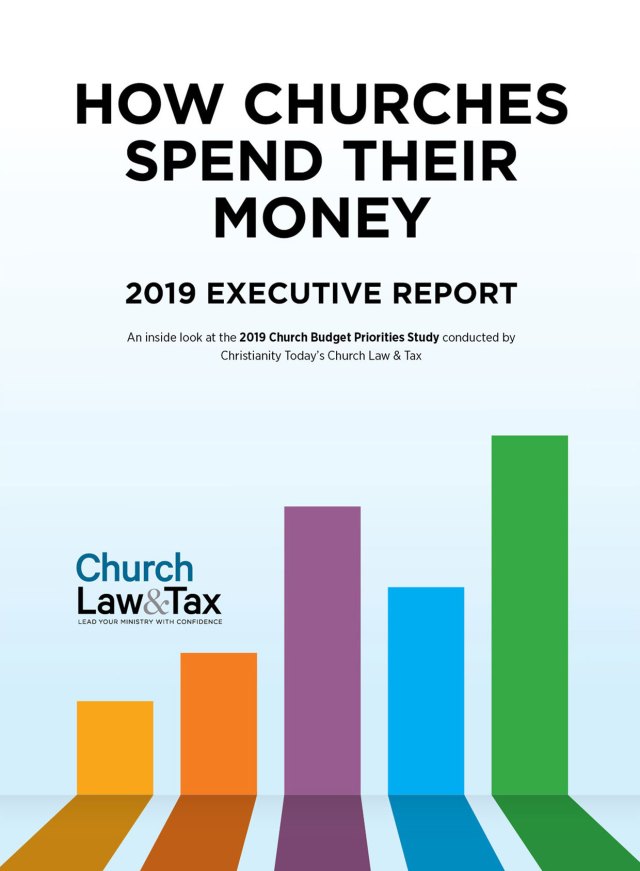Church salaries comprise a growing percentage of church budget allocations. Large churches spent 52 percent of their total budgets on staff salaries in 2018, compared to 49 percent in 2016, according to data from the biennial Large Church Salary Survey conducted by Leadership Network.
As Church Law & Tax has previously reported, churches have no legal obligation to disclose salaries to the public or to church members. Even where denominations ask for pastor salary data in annual reports, they often do not require the salaries to be itemized by person, said Dan Busby, president of the Evangelical Council for Financial Accountability (ECFA).
As a result, it is often up to the church leaders at individual churches to decide how transparent they will be about salaries. Where churches report salaries to their congregations, they most often take the form of a lump sum that includes all salaries and fringe benefits and are not itemized by individual, Busby said.
“ECFA’s standards do not address how churches should handle the confidentiality or transparency of the compensation of church leaders,” he said in an email. “We leave this issue to the wisdom and discretion of church leaders. Neither do we promulgate any best practices on this topic.”
Art Rainer, vice president for institutional advancement at Southeastern Baptist Theological Seminary and author of The Minister’s Salary, pointed out in his book that unless staff are trying to deceive their congregations disclosing or protecting salary information is not a matter of morality, but it does have a practical impact on pastors and others.
“Most people, not just ministers, are uncomfortable having their salaries displayed before the public on a regular basis,” he wrote. “Some positions in the secular world require such disclosure as with politicians and executives in publicly traded companies. But most people do not have to deal with the prying eyes of personal finances.”
Among large churches—churches with 500 or more attendees—only 1 percent provide detailed salary information to their entire congregations, according to a 2016 survey conducted by Leadership Network. Another 1 percent provide this information to the entire staff. The vast majority of churches surveyed (81 percent) only provide the information to some combination of senior staff, in-house financial staff, and the church board.
Small and midsize churches might be more forthcoming with salary details, said Jeffrey Derico, educational programming coordinator for the Center for Church Leadership. Smaller churches have fewer individual salaries to account for, making it more likely for individual salaries to be apparent to the congregation. On the other hand, large churches that disclosed individual salaries might face an added challenge of having to explain discrepancies between different ministers’ compensation in salary and other benefits, both to congregants and other staff.
Challenges aside, the question of whether a church should disclose individual salaries should be considered in light of the church’s broader financial situation, Derico said.
“In an admittedly absurd situation in which the minister sets his own salary, full transparency would be extremely important,” he said in an email. “However, transparency is not as important—if transparency is designed to produce donor confidence—when a church has well-designed systems and processes that produce good decisions and mitigate abuses.”
Salary nondisclosure isn’t necessarily bad, said Ron Edmondson, CEO of Leadership Network, which provides information and services to large churches in the US. It is more important that churches are transparent with how they spend congregants’ money than that they disclose detailed salary information, Edmondson said.
“This issue has so much to do with the bigger issue of how the church handles finances. The church needs to be overly transparent with where the money goes,” he said. “If 45 percent of the budget goes to salary, tell everyone that. It’s the individual line items that can be more hurtful than helpful.”
Edmondson previously worked as a pastor and a church planter. Most recently, he was the lead pastor of Immanuel Baptist Church in Lexington, Kentucky. Edmondson pointed out that providing pastoral salary information to congregations can be uncomfortable for the pastors involved.
“It’s hard enough pastoring without feeling that your performance is tied to your pay,” he said. “If your salary is something that everybody talks about on the street or in the church, it’s an awkward position to place pastors and [their] families in.”
While it is important for churches to be financially accountable, including sharing financial information with congregations and undergoing regular financial audits, sharing detailed salary information is not usually necessary, Edmondson said. In general, church leaders trying to set fair salaries for their staff should do so by consulting surveys and researching salaries at similarly sized churches, he said. They should not set salaries by only consulting congregants, many of whom have not researched the topic and might make suggestions based more on feelings or perception than data.
“No church would form a committee of 250 people,” he said. “The more people you put in the room, the more opinions you put in the room, and the more it becomes a matter of opinion rather than well-documented financial practices.”
While some people in a congregation might need or want to know the salaries of their pastors and church staff, it is generally not a wise financial move to give an entire congregation the power to set or change those salaries, Edmondson said.
“We shouldn’t pay pastors and staff members based on popular opinion, but on prayerful consideration,” he said. “A smaller group needs to do the proper research so that they have comparable numbers. If you put it into a crowded room and the whole church is weighing in, that pastor’s pay is often going to be based on the last good sermon.”
Ruth Moon Mari is the editor of Response at Seattle Pacific University. She has a doctorate in communication from the University of Washington. Beginning in August of 2019, she will be an assistant professor of communication at Louisiana State University.
For more guidance on church compensation-setting practices, check out the following resources:





